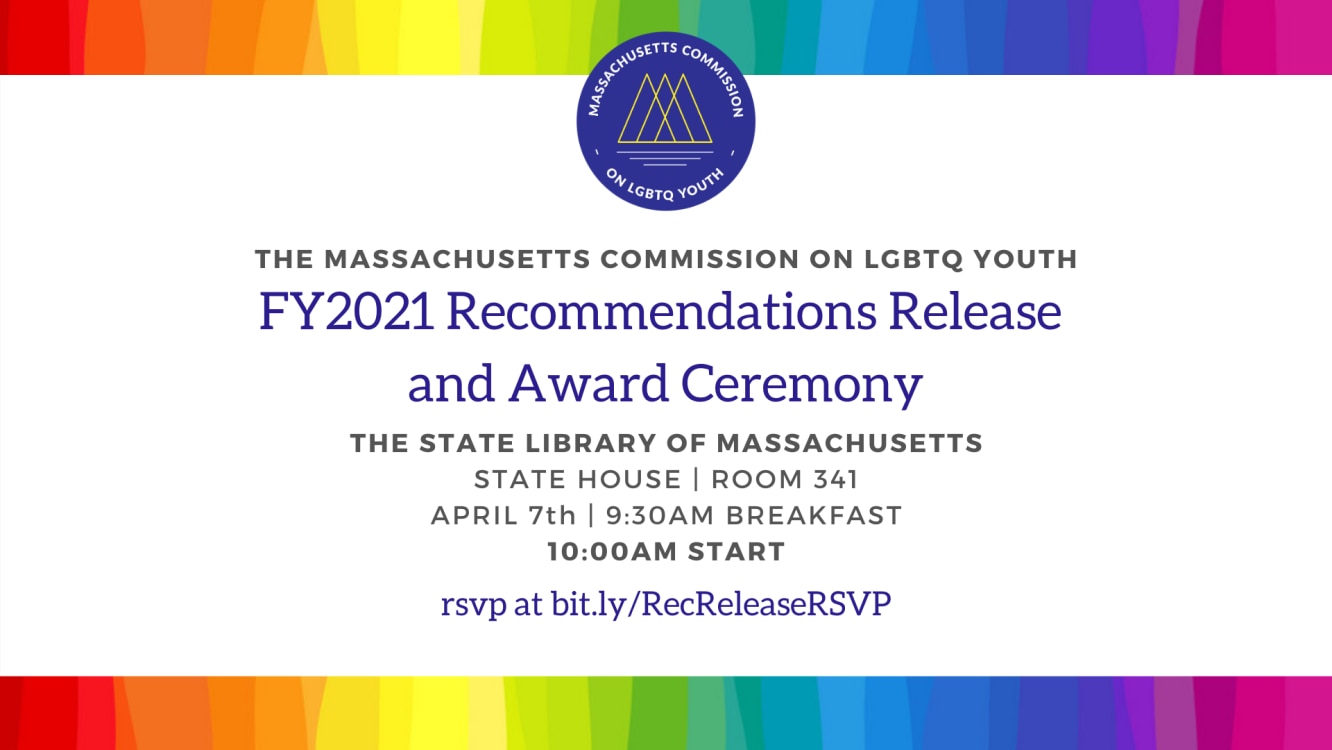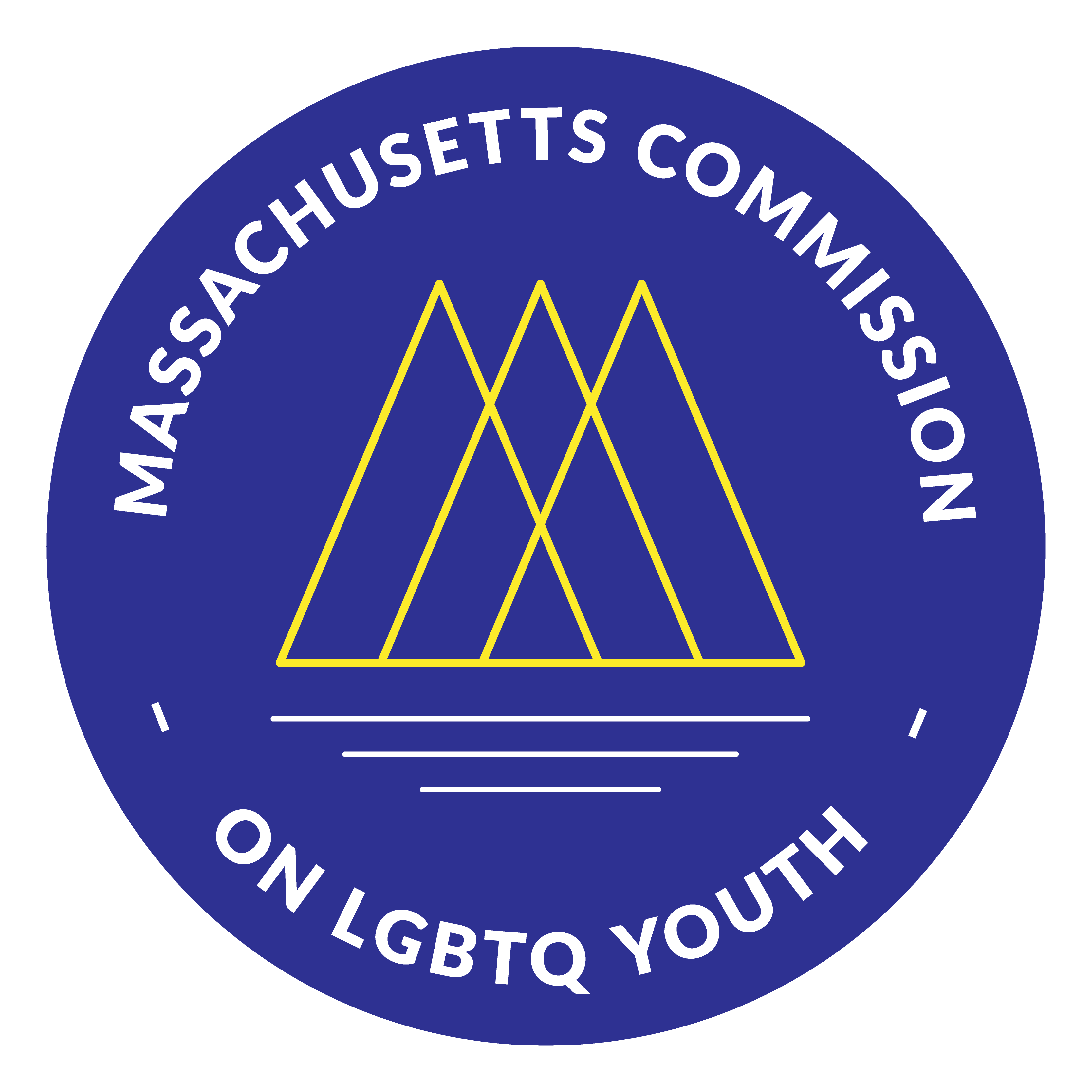- Massachusetts Commission on LGBTQ Youth
Media Contact
Dr. Jo Trigilio

BOSTON, MA — The Massachusetts Commission on LGBTQ Youth is pleased to announce that its annual recommendations release event will occur on April 7th at 10:00am at the State House Library. In addition to releasing its annual policy report, the Commission will also publicly swear in its 50 members from across Massachusetts and present awards to those making a difference in the lives of LGBTQ youth. Doors will open and breakfast served at 9:30am, with the event starting thereafter. RSVPs for the event are now being accepted here.
This year will mark our third annual Advancing Equity Awards, for which we are currently accepting nominations. Anyone of any age who resides in Massachusetts and who is making an impact in the lives of LGBTQ youth can be nominated. Those from underrepresented groups and those who work in our core policy areas (homelessness, juvenile justice, health, and social inclusion) are particularly strong candidates. Nominations can be accessed here and are due by Monday, February 24th.
Residents from across Massachusetts are currently able to provide feedback on what they see as key issues and opportunities facing LGBTQ youth. The Commission welcomes youth, families, providers, and allies to share their thoughts and suggestions. While the comment portal is open year-round, feedback must be submitted by March 20th for consideration in this year’s recommendations report. Hearing the community weigh in on their priorities helps inform the Commission on how to improve services for LGBTQ youth and reduce the inequities.
Community perspectives play a vital role in the Commission’s recommendations to government entities, including:
- The Legislature and Governor;
- The agencies that oversee early childhood, elementary, secondary, and higher education;
- The agencies that oversee the foster care, juvenile justice, and adult criminal justice systems;
- The agencies that provide support to special populations such as immigrants, people experiencing homelessness, and people with disabilities;
- And more.
Past respondents have included youth who have first-hand experience with schools and other government services, such as those who have participated in GSAs or experienced bullying; parents of youth who are impacted by LGBTQ-related policies; teachers and other educational professionals; those who provide services to youth; and those who work within or interact with the government agencies to whom the Commission issues recommendations. Anyone with experiences or opinions on issues affecting LGBTQ youth in Massachusetts is welcome to submit feedback for review by the Commission’s staff.
Last year’s recommendations contained guidance on updating sexual health education to be LGBTQ-inclusive, and included quotes that served to inform this recommendation. “Queer-inclusive sex ed is important because without it, there is no way for queer kids, without the resources, to know themselves to practice safe sex,” one student from the GSA Leadership Council said.
“In addition, proper queer sex ed would help destigmatize… queer relationships.”
Parents also weighed in with invaluable feedback on LGBTQ youth issues, “The topic of gender and sexuality is still avoided at all costs. Our school seems to be scared that this topic is "too mature" for elementary school students,” a mother from the North Shore area of Massachusetts said. “There needs to be an openness to talking about gender to kids. They get it! I think the administration is more scared of the closed-minded parents’ reaction. There is still so much more work to do.”
Provider and educator perspectives are often included to show what services may need improvements. A service provider located in Central Massachusetts said “In acute mental health placements (CBAT, ICBAT, and inpatient) trans youth often face barriers to accessing treatment. Nearly all such facilities throughout the state will only place trans youth into a single occupancy room. As most facilities have a limited number of single rooms, trans youth experiencing a mental health crisis often have extended waits for treatment.”
For consideration in this year’s recommendations, feedback is due to the web submission form by Monday, March 20th, but early submission is highly encouraged.
###
